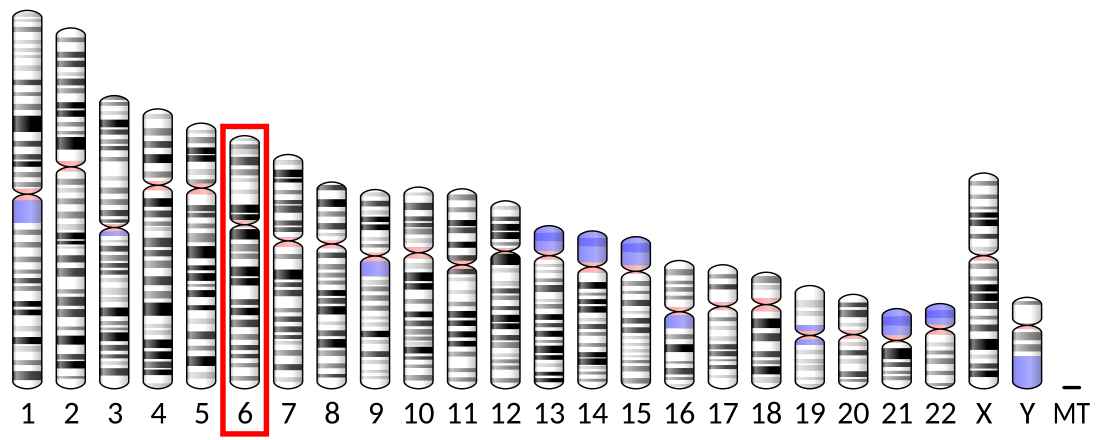Top Qs
Timeline
Chat
Perspective
AARS2
Protein-coding gene in the species Homo sapiens From Wikipedia, the free encyclopedia
Remove ads
Alanyl—tRNA synthetase, mitochondrial, also known as alanine—tRNA ligase (AlaRS) or alanyl—tRNA synthetase 2 (AARS2), is an enzyme that in humans is encoded by the AARS2 gene.[5][6]
Remove ads
Clinical relevance
Gene changes in the AARS2 gene result in infantile mitochondrial cardiomyopathies.[7] Progressive leukoencephalopathy with Ovarian Failure (LKENP).
Function
The AARS2 gene provides instructions for producing alanyl-tRNA synthetase 2, which is localized to mitochondria. This enzyme plays a critical role in the fidelity of mitochondrial protein translation by charging tRNAs with the correct amino acid (alanine). Proper mitochondrial protein synthesis is essential for the assembly and function of the oxidative phosphorylation system, which drives ATP production. Dysregulation of this process can disrupt cellular energy homeostasis and lead to a cascade of pathophysiological effects.
Remove ads
Pathogenic Variants and Associated Disorders
Leukoencephalopathy
AARS2-related leukodystrophy causes dementia, upper motor neuron signs and ataxia.
Ovarian Failure
A subset of patients with AARS2 gene changes has been reported to exhibit premature ovarian insufficiency (POI), indicating a potential link between mitochondrial dysfunction and reproductive health. POI is often an early or predominant manifestation in affected women.
Cardiac and Multisystem Disorders
Emerging reports describe AARS2 variants in patients with cardiomyopathy, including dilated cardiomyopathy, alongside neurological and systemic manifestations. These findings underscore the pleiotropic effects of AARS2 mutations on multiple organ systems.
Genetics
The AARS2 gene is located on chromosome 6 (6p21.1) and comprises 20 exons. Mutations reported include missense, nonsense, and splice-site variants, as well as deletions. Pathogenic mutations often lead to impaired enzyme function, resulting in defective mitochondrial protein synthesis. The inheritance pattern is autosomal recessive, requiring both alleles to carry mutations for the disorder to manifest.
Remove ads
Diagnosis
Clinical Presentation
Patients may present with a combination of neurological symptoms, including ataxia, spasticity, and cognitive decline. In cases of LBSL, characteristic MRI findings are critical for diagnosis.
Genetic Testing
Diagnostic confirmation involves genetic testing to identify pathogenic variants in AARS2. Whole exome sequencing (WES) or targeted gene panels for mitochondrial disorders are commonly used.
Biochemical Tests
Elevated lactate levels in the cerebrospinal fluid or through magnetic resonance spectroscopy (MRS) can provide supportive evidence of mitochondrial dysfunction.
Remove ads
Management
Currently, there are no specific treatments targeting AARS2-related disorders. Management is primarily supportive and symptom-based:
Neurological Symptoms: Physical therapy, occupational therapy, and medications for spasticity (e.g., baclofen) may improve quality of life.
Premature Ovarian Insufficiency: Hormone replacement therapy (HRT) and fertility counseling are recommended for affected women.
Cardiac Symptoms: Routine cardiac monitoring and management by a cardiologist are essential in patients with cardiomyopathy.
Remove ads
Research Directions
Mechanistic Studies
Ongoing research aims to understand the molecular mechanisms linking AARS2 mutations to mitochondrial dysfunction. Insights into these pathways could reveal novel therapeutic targets.
Therapeutic Development
Gene therapy, small-molecule chaperones, and mitochondrial-targeted antioxidants are potential avenues under investigation to address mitochondrial disorders, including those involving AARS2.
Remove ads
Resources for Patients and Families
Patient Advocacy Groups
CureARS - a non-profit organization dedicated to spreading awareness, connecting & providing support to affected families and funding research for the ultra-rare Mitochondrial ARS genes.
United Mitochondrial Disease Foundation (UMDF)
The Lily Foundation (United Kingdom) - A charity supporting patients and families affected by mitochondrial diseases.
Alex TLC (United Kingdom) - Advocacy and support for individuals with leukodystrophies, including a dedicated page on AARS2-related conditions.
AEPMI - Asociación Española de Pacientes con Enfermedades Mitocondriales (Spain) - Spanish organization providing resources and support for mitochondrial disease patients.
Genetic Counseling
Families affected by AARS2-related disorders are encouraged to seek genetic counseling for reproductive planning and understanding inheritance patterns.
Clinical Trials
A search on ClinicalTrials.gov can provide updates on ongoing research and experimental treatments for mitochondrial diseases.
Support Networks
Online communities and forums for mitochondrial disease patients and caregivers offer emotional support and shared experiences.
Remove ads
References
van Berge L, et al. (2014). "AARS2 mutations: A common cause of leukoencephalopathy with brainstem and spinal cord involvement and lactate elevation (LBSL)." Brain.
Isohanni P, et al. (2019). "Novel phenotypes associated with AARS2 mutations." Journal of Inherited Metabolic Disease.
Sofou K, et al. (2015). "AARS2-related mitochondrial cardiomyopathy: Expanding the clinical spectrum." European Journal of Medical Genetics.
Online Mendelian Inheritance in Man (OMIM). AARS2. OMIM Entry.
References
Further reading
See also
External links
Wikiwand - on
Seamless Wikipedia browsing. On steroids.
Remove ads




